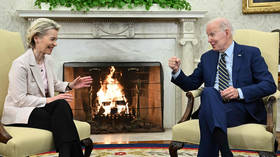UK’s Wallace explains why Biden ended his NATO dream
The US wanted a former head of state to lead the bloc, the British defense minister has said
US President Joe Biden probably wanted a former prime minister or president as secretary-general of NATO, but its 31 members could not agree on who that should be, the outgoing UK Defence Secretary Ben Wallace said on Tuesday.
“I think the Americans probably wanted a head of state,” Wallace said, appearing at a conference about the future of Britain organized by the Tony Blair Institute. “If I have a theory, I think they thought, ‘31 members, what they really want is an ex-prime minister or president’,” he added.
He revealed that Biden had spoken to now-former Dutch PM Mark Rutte about the job on at least two occasions, but Rutte “made it very clear” he was not interested. Earlier this month, Rutte resigned and left politics after nearly 13 years in power, when his coalition collapsed over migration policy.
Once Rutte was out of the picture, Wallace put his name forward, and received plenty of support from Prime Minister Rishi Sunak, but not from the Americans.
“Why do you not support your closest ally when they put forward a candidate? I think it’s a fair question,” Wallace had told the Times in an interview published on Saturday, announcing his resignation from the cabinet.
Speaking at the Blair Institute event, Wallace described the process of choosing the NATO head as less transparent than Tory party politicking.
“31 NATO members, with no process, no balance, no one ever declares actually that they want to be a candidate… So who knows how it worked? There were obviously competing views,” he said.
Some members said it was time for a female secretary-general, but ruled out anyone from a country that wasn’t meeting the military spending target of 2% of GDP. “So suddenly you get down to Eastern European women – the brilliant PM of Estonia – and of course they are too hawkish for potentially the Germans or the French,” Wallace explained.
“NATO stands strong,” Biden had said on July 11, when the summit began. By the end, the bloc could not agree on a replacement for Jens Stoltenberg and extended his term yet again, to 2024.
“I did say at one stage we should all just get used to the secretary-general from Iceland,” Wallace quipped, to laughter from the audience. “Poor old Jens is doing a three-year job over 10 years.”
Stoltenberg became the head of NATO leadership in 2014, after losing power in Norway. In an unprecedented move, the US-led military bloc extended his term by four years in 2018, and then by another year in 2022, with the intent of finally replacing him at last week’s summit in Vilnius, Lithuania.
Iceland has no standing army and joined NATO due to its strategic position in the North Atlantic. Though its president is male, both the prime minister and foreign minister – who stands in for the nonexistent defense minister – are currently women.







Comments are closed.